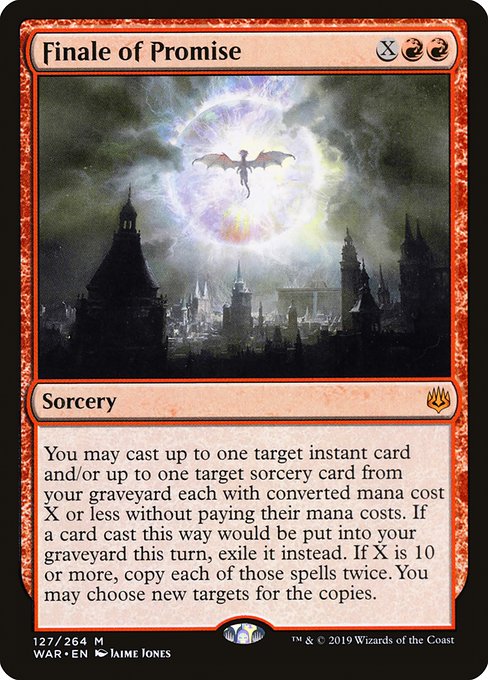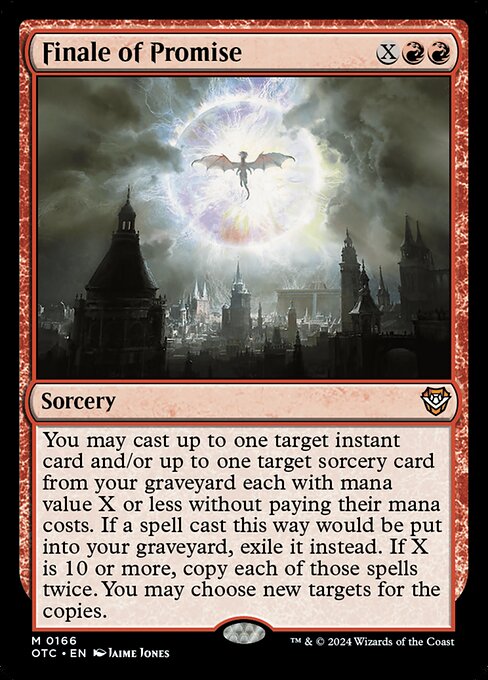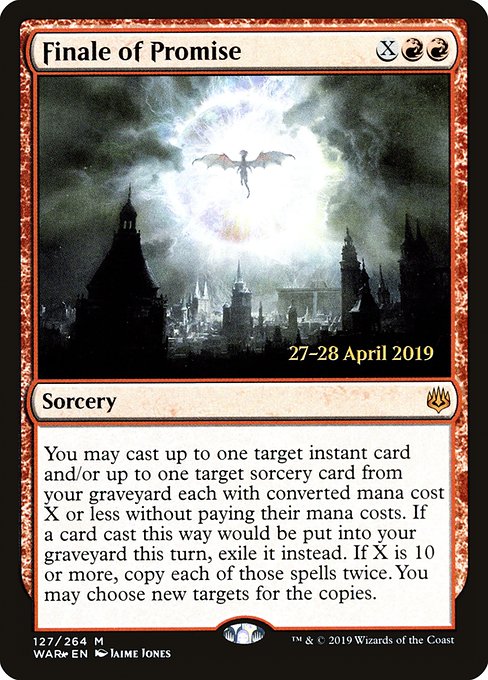Summum de la promesse
Rituel
Vous pouvez lancer jusqu'à une carte d'éphémère ciblée et/ou jusqu'à une carte de rituel ciblée chacune avec un coût converti de mana inférieur ou égal à X depuis votre cimetière sans payer leur coût de mana. Si une carte lancée de cette manière devait être mise dans votre cimetière ce tour-ci, exilez-la à la place. Si X est supérieur ou égal à 10, copiez chacun de ces sorts deux fois. Vous pouvez choisir de nouvelles cibles pour ces copies.
standard
future
historic
gladiator
pioneer
explorer
modern
legacy
pauper
vintage
penny
commander
brawl
alchemy
paupercommander
duel
oldschool
premodern
Rulings
The copies that Finale of Promise creates are created on the stack, so they’re not “cast.” Abilities that trigger when a player casts a spell won’t trigger.
If the spell has damage divided as it was cast, the division can’t be changed (although the targets receiving that damage still can). The same is true of spells that distribute counters.
If a spell has in its mana cost, you must choose 0 as the value of X when casting it without paying its mana cost.
If the spell that’s copied is modal (that is, it says “Choose one—” or the like), the copies will have the same mode or modes. You can’t choose different ones.
A split card that’s an instant and a sorcery card may be the target of Finale of Promise twice. However, once you cast that card once, it can’t be cast a second time.
You can’t choose to pay any additional costs for the copies. However, effects based on any additional costs that were paid for the original spell are copied as though those same costs were paid for the copy too.
As Finale of Promise resolves, first you cast the target instant card and/or the target sorcery card in either order. Then, if X is 10 or more, you copy each of those twice and put the copies on the stack in any order. The copies will resolve before the original spells.
If you cast a card “without paying its mana cost,” you can’t choose to cast it for any alternative costs. You can, however, pay additional costs. If the card has any mandatory additional costs, such as that of Spark Harvest, you must pay those to cast the card.
If the spell has damage divided as it was cast, the division can’t be changed (although the targets receiving that damage still can). The same is true of spells that distribute counters.
If a spell has in its mana cost, you must choose 0 as the value of X when casting it without paying its mana cost.
If the spell that’s copied is modal (that is, it says “Choose one—” or the like), the copies will have the same mode or modes. You can’t choose different ones.
A split card that’s an instant and a sorcery card may be the target of Finale of Promise twice. However, once you cast that card once, it can’t be cast a second time.
You can’t choose to pay any additional costs for the copies. However, effects based on any additional costs that were paid for the original spell are copied as though those same costs were paid for the copy too.
As Finale of Promise resolves, first you cast the target instant card and/or the target sorcery card in either order. Then, if X is 10 or more, you copy each of those twice and put the copies on the stack in any order. The copies will resolve before the original spells.
If you cast a card “without paying its mana cost,” you can’t choose to cast it for any alternative costs. You can, however, pay additional costs. If the card has any mandatory additional costs, such as that of Spark Harvest, you must pay those to cast the card.
Rulings
The copies that Finale of Promise creates are created on the stack, so they’re not “cast.” Abilities that trigger when a player casts a spell won’t trigger.
If the spell has damage divided as it was cast, the division can’t be changed (although the targets receiving that damage still can). The same is true of spells that distribute counters.
If a spell has in its mana cost, you must choose 0 as the value of X when casting it without paying its mana cost.
If the spell that’s copied is modal (that is, it says “Choose one—” or the like), the copies will have the same mode or modes. You can’t choose different ones.
A split card that’s an instant and a sorcery card may be the target of Finale of Promise twice. However, once you cast that card once, it can’t be cast a second time.
You can’t choose to pay any additional costs for the copies. However, effects based on any additional costs that were paid for the original spell are copied as though those same costs were paid for the copy too.
As Finale of Promise resolves, first you cast the target instant card and/or the target sorcery card in either order. Then, if X is 10 or more, you copy each of those twice and put the copies on the stack in any order. The copies will resolve before the original spells.
If you cast a card “without paying its mana cost,” you can’t choose to cast it for any alternative costs. You can, however, pay additional costs. If the card has any mandatory additional costs, such as that of Spark Harvest, you must pay those to cast the card.
If the spell has damage divided as it was cast, the division can’t be changed (although the targets receiving that damage still can). The same is true of spells that distribute counters.
If a spell has in its mana cost, you must choose 0 as the value of X when casting it without paying its mana cost.
If the spell that’s copied is modal (that is, it says “Choose one—” or the like), the copies will have the same mode or modes. You can’t choose different ones.
A split card that’s an instant and a sorcery card may be the target of Finale of Promise twice. However, once you cast that card once, it can’t be cast a second time.
You can’t choose to pay any additional costs for the copies. However, effects based on any additional costs that were paid for the original spell are copied as though those same costs were paid for the copy too.
As Finale of Promise resolves, first you cast the target instant card and/or the target sorcery card in either order. Then, if X is 10 or more, you copy each of those twice and put the copies on the stack in any order. The copies will resolve before the original spells.
If you cast a card “without paying its mana cost,” you can’t choose to cast it for any alternative costs. You can, however, pay additional costs. If the card has any mandatory additional costs, such as that of Spark Harvest, you must pay those to cast the card.
Votre collection ? vos decks ?
Envie de gérer votre collection et/ou créer des decks ?



 0
0
 0.40€
0.40€
